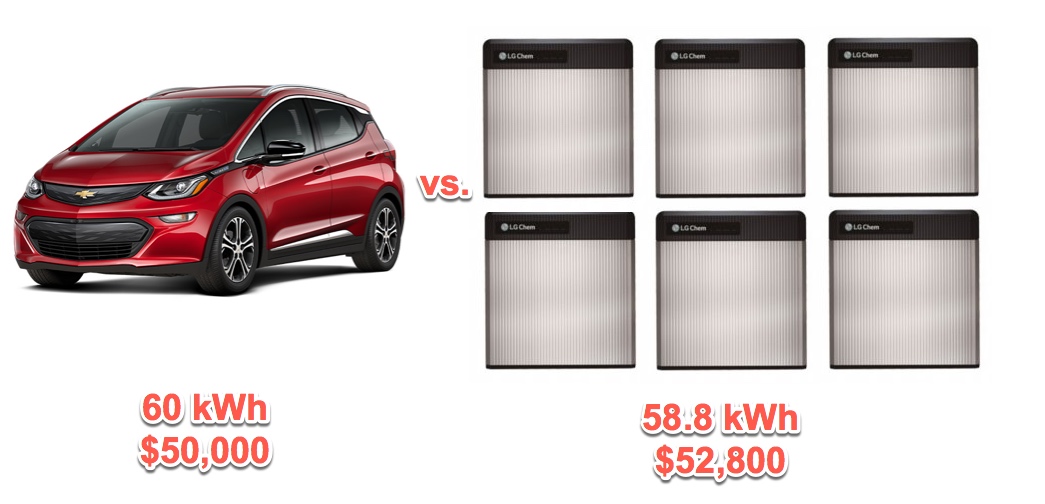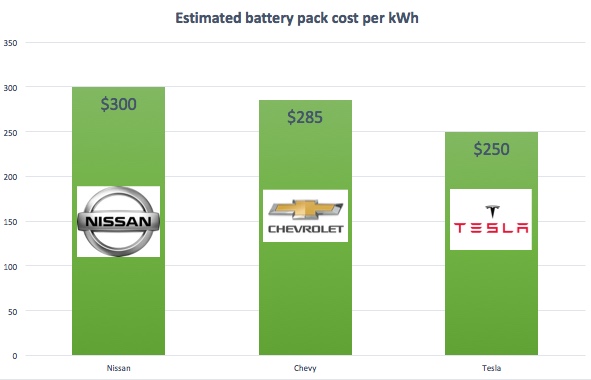
You can buy 60kWh of storage in a Chevy Bolt for a similar price to 60kWh of uninstalled home battery packs.
Looking to buy some LG Chem batteries but don't want to pay full price? In that case, I have a little scheme you might be interested in.
If you want to, you could buy an LG Chem RESU6.5 battery system which will set you back around $1,000 per kilowatt-hour of storage. Or you could do a little better by buying a RESU10 as that will only cost you around $900 a kilowatt-hour. But if you follow my advice you can net yourself LG Chem batteries for only $822 a kilowatt-hour.
There is a slight drawback to my plan in that you have to buy 60 kilowatt-hours of batteries to get them for that price. But trust me, it's well worth it because if you buy these batteries you get a free stereo system! There is no denying that's a sweet deal.
But wait, there's still more! You also get, an air conditioner! Two padded seats! A three person couch! A 150 kilowatt electric motor! Four wheels!1 And a car chassis!
Yes, that's right! My plan is to go to the United States and buy a 2017 Chevy Bolt electric car when it comes out at the end of this year. This will score us LG Chem batteries at a price that's around 8% cheaper per kilowatt-hour than buying a RESU10 and they come wrapped in a handy mobile package called an electric car for free.
With 9.8 kilowatt-hours of batteries each, it would take six of the inaccurately named RESU10s to almost have the same battery capacity as the Bolts battery pack and they would cost around $52,800 to buy retail and uninstalled. The cost of the Bolt is $37,495 US and at the current exchange rate of 76 US cents to the Australian dollar that comes to $49,340.
The Bolt Is Not Available In AustraliaTo actually bring a Bolt into Australia would cost money for shipping and GST would have to be paid, but my point is not that Australians will be able to buy a Bolt in Australia for under $50,000. My point is that, given how much the Bolt costs, lithium-ion home energy storage is probably going to fall a long way in price.
One Of These Things Is Not Like The OtherI freely admit I am not comparing like to like here. It is not exactly an apples to oranges comparison, it is exactly a home battery storage unit to an electric vehicle comparison, and they are not the same thing.
For example, the car battery pack can save on its manufacturing cost by only needing a single bundle of electronics to serve as a battery management system, while the six RESUs will require one each. On the other hand, the car battery pack has an active liquid cooling system which is probably more expensive than the entirely passive cooling the RESUs use.
The chemistry of the batteries is probably also different. At first I assumed they would definitely have different chemistries, as they have very different jobs to do. But their energy densities are around the same which suggests a similar chemistry and it is even possible the cells are identical to save on manufacturing costs, although I would expect them to at least tweak them a bit.
But even if they have very different chemistries I doubt it would make much difference to their cost. While the material cost of electrodes and the electrolyte filling in a battery cell sandwich isn't cheap, it is only a small part of the cost of making one. Most of the expense is in the entirely automated production lines that assemble them. Those robots don't come cheap.
RESUs Have Longer WarrantiesTheir warranties are a major difference. A RESU is covered for the first of either 10 years or a little under 2,500 kilowatt-hours of stored electricity per kilowatt-hour of capacity.
The Bolt's battery pack warranty covers the first of 8 years or 160,900 kilometers. A Bolt driven an average of over 55 kilometers a day will run out of warranty before the 8 years are up. With a typical electric car consumption of around 1 kilowatt-hour per 5.5 kilometers of driving, when it reaches the end of its warranty it will have only stored around 490 kilowatt-hours for each kilowatt-hour of battery capacity or 20% as much as a RESU.

The LG RESU battery has a much better warranty that the Chevy Bolt's batteries
But the Bolt's minimum battery capacity at the end of its warranty is likely to be higher than the RESU's 60%. It may be 70%, so the comparison probably isn't quite as bad as it seems. But it's still pretty bad.
The reason why there is such a large difference in their warranties is because they do two very different jobs. The Bolt has a 150 kilowatt motor. I'm guessing it wouldn't have that unless the battery pack could supply 150 kilowatts of power for at least a short time and that's a lot more power per kilowatt-hour of capacity than any RESU can manage.
High power also means it will generate more heat. While the Bolt battery pack has a liquid cooling system, it is likely to be exposed to more extreme temperature than a RESU. A car can get very hot just leaving it out in the sun and this is a major reason why electric car makers are in no hurry to put solar cells on them. They'd rather you park them in the shade so the batteries will last longer.
Car Battery PricesOne year ago General Motors said they would be paying $190 a kilowatt-hour for LG Chem's battery cells. LG Chem wasn't very happy about that and would have preferred it if General Motors had kept its big mouth shut so they could charge other people more.
That $190 is just for the cells and not for the cost of putting them all together in a battery pack with the required electronics. One estimate for the cost of the battery pack is $285 a kilowatt-hour. If that is correct then even if it costs considerably more to turn battery cells into RESUs, LG Chem could drop their price by about half while still making enough money on each unit for it to be worthwhile.
Other car manufactures could also have very low battery pack costs. One estimate is Tesla may only be paying $250 a kilowatt-hour for theirs. While some say this estimate is laughable, it seems certain Tesla's costs will fall below that once their Gigglefactory is complete.2
Meanwhile, Nissan has been offering to replace Leaf battery packs for $300 a kilowatt-hour for two years now, but you have to give them your old pack for free.

A very rough guess of the cost to manufacture car battery packs for Nissan, Chevy & Tesla.
Why Home Energy Storage Isn't Cheaper NowIf LG Chem and Tesla and whoever can make electric car battery packs cheaply now, why does home energy storage cost so much more?
Well, firstly, getting to the point where they could make battery packs at the cost took who knows how many millions upon millions of dollars and the companies involved would like to make it all back. And after they've made their millions upon millions of dollars back they'd like to make millions upon millions of dollars more on top of that, so they're not going to be in a hurry to lower their prices until competition forces them to.
But I am certain competition will work its magic. Which is another way of saying that human self interest will triumph. And we will see lithium-ion storage prices fall a long way over the next few years. A 10% a year decline in prices will see them halve in a little over 7 years, but it could be a lot faster once someone decides they can make a little more money supplying large amounts of battery storage to Australian homes and businesses than to electric car makers.
If we play pretend and say that LG Chem can currently produce cells for home energy storage for the same price as General Motors says they buy them for the Bolt and they can turn them into RESUs for an average of $250 per kilowatt-hour while still making an acceptable profit, then the cost of home battery storage could fall by more than half without further technological advances. And that will be enough to make it cost effective for a considerable number of Australians. Bring it on!
FootnotesSource: Chevy Bolt Electric Car Reveals How Cheap Batteries Really Are
No comments:
Post a Comment